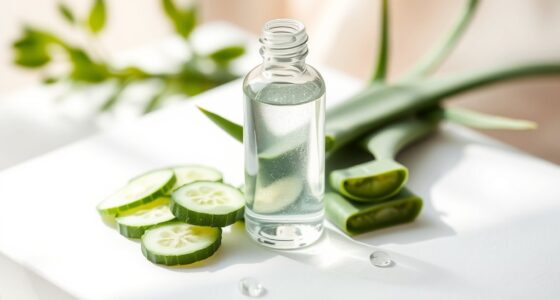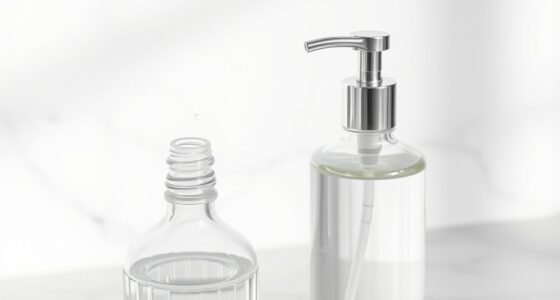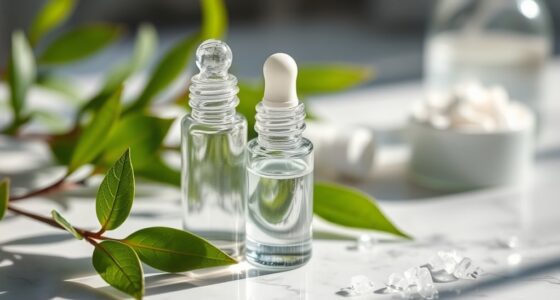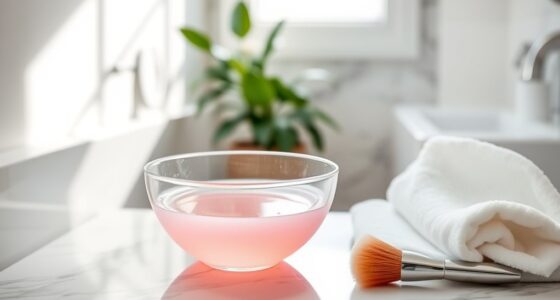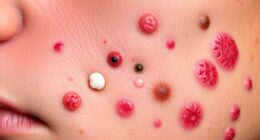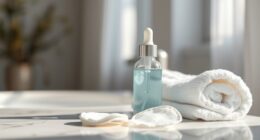Alcohol in toners can be helpful if you want quick-drying effects and better oil control, especially for oily or acne-prone skin. However, it might cause irritation, dryness, and disrupt your skin’s natural pH, leading to more problems over time. Those with sensitive or redness-prone skin should be cautious. Understanding how alcohol affects your skin can help you find the right balance—and there’s more you can learn about making informed choices.
Key Takeaways
- Alcohol in toners promotes quick drying and deep cleansing but may cause irritation for sensitive skin.
- It can disrupt the skin’s natural pH balance, leading to increased oiliness and breakouts over time.
- Regular use of alcohol-based toners may weaken the skin barrier, causing dryness, dullness, and heightened sensitivity.
- For oily or acne-prone skin, alcohol can help reduce excess oil and bacteria, offering some benefits.
- Alternatives like alcohol-free toners with soothing ingredients are safer options for sensitive or compromised skin.
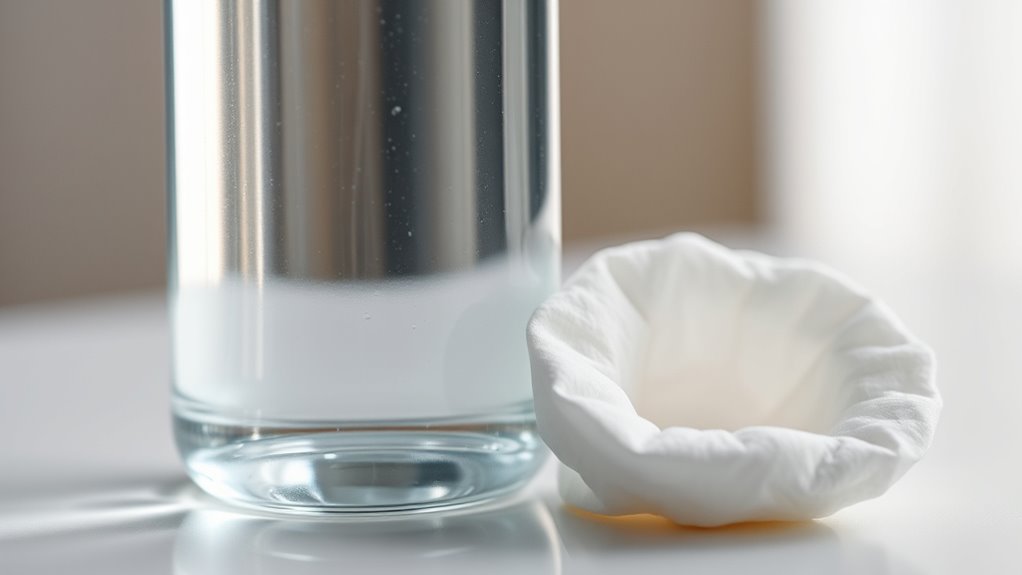
Have you ever wondered why many toners contain alcohol? The answer often comes down to its quick-drying properties, which can make your skin feel refreshed and clean. However, while alcohol can offer benefits, it also has potential drawbacks that you should be aware of. One of the primary concerns with alcohol in toners is skin irritation. If your skin is sensitive or prone to redness, alcohol can sometimes exacerbate these issues. It can strip away natural oils, leaving your skin feeling tight or dry, and in some cases, cause burning or stinging sensations. This irritation can be especially problematic if you’re already battling skin conditions like eczema or rosacea, where the skin barrier is compromised. Additionally, regular use of alcohol-based toners may lead to increased oil production over time, creating a cycle of dryness and oiliness that can be hard to break. Another important aspect to contemplate is how alcohol affects your skin’s pH balance. The skin’s natural pH hovers around 4.5 to 5.5, which helps keep harmful bacteria at bay and maintains a healthy barrier. Many alcohol-based toners tend to be more alkaline, which means they can disrupt this delicate pH balance. When your skin’s pH is thrown off, it can lead to increased oil production, clogged pores, and even breakouts. Over time, frequent use of alcohol-laden toners may weaken your skin’s defenses, making it more vulnerable to environmental stressors and bacteria. This imbalance can also slow down the healing process and contribute to dull, uneven skin tone.
Despite these concerns, alcohol isn’t inherently bad. It can act as an effective astringent, helping to remove excess oil, dirt, and bacteria. For some skin types, especially those with oily or acne-prone skin, alcohol-based toners can help keep pores clear and reduce breakouts. But the key is moderation and understanding your skin’s unique needs. If you notice increased dryness, redness, or irritation after using a toner with alcohol, it’s a sign to rethink its use. Opting for alcohol-free formulas or those with soothing ingredients like witch hazel or rose water can be gentler options that still help maintain your skin’s balance. Being aware of skin pH balance and choosing products accordingly can help maintain healthier skin in the long run.
Frequently Asked Questions
Can Alcohol in Toners Cause Long-Term Skin Damage?
Alcohol in toners can potentially cause long-term skin damage if used excessively, as it may weaken your skin barrier. This damage can lead to increased sensitivity, dryness, and even accelerate skin aging over time. You should be cautious with products containing alcohol, especially if you have sensitive or dry skin. Opting for alcohol-free toners helps maintain your skin’s health, keeping your barrier strong and reducing premature aging risks.
Are Alcohol-Based Toners Suitable for Sensitive Skin Types?
Did you know that 60% of people with sensitive skin experience pore clogging or skin irritation from alcohol-based toners? If you have sensitive skin, these toners might not be suitable because alcohol can worsen irritation and clog pores. Instead, look for alcohol-free options with soothing ingredients. Using the right toner helps maintain your skin’s balance without causing unnecessary irritation or pore clogging, making it better suited for sensitive skin types.
How Does Alcohol in Toners Affect Acne-Prone Skin?
Alcohol effects on acne-prone skin can be quite damaging. It can strip your skin’s natural oils, leading to dryness and irritation, and weaken your skin barrier. This makes your skin more vulnerable to bacteria and breakouts. If you notice increased acne or irritation, it’s likely due to alcohol in your toner. To keep your skin healthy, opt for alcohol-free formulas that support your skin barrier and reduce inflammation.
What Alternatives Exist for Alcohol-Free Toners?
Like a trusted compass guiding you through skincare choices, alcohol-free toners offer gentle yet effective solutions. You can opt for herbal extracts that soothe and balance your skin, avoiding harsh ingredients. Hydrating formulas with ingredients like rose water or aloe vera refresh without stripping moisture. These alternatives help maintain your skin’s natural barrier, making them ideal for sensitive or acne-prone skin, ensuring your routine stays both nourishing and effective.
Does Alcohol in Toners Help With Oil Control?
Alcohol in toners can help with oil absorption by temporarily tightening pores and reducing excess oil. It also helps maintain pH balance, preventing bacteria growth. However, if your skin is sensitive or dry, alcohol might strip moisture, causing irritation or overproduction of oil. So, while alcohol can control oil temporarily, it’s best to contemplate your skin type and look for gentle options that support long-term skin health.
Conclusion
So, next time you reach for that alcohol-laden toner, remember it’s both a friend and a foe. It promises to cleanse and refresh, yet secretly strips away your skin’s natural defenses. You might think you’re giving your skin a quick fix, but it’s like pouring gasoline on a small fire—sure, it burns bright now, but it’s only a matter of time before you’re left battling the aftermath. Ironically, what’s supposed to help might just hurt the most.



